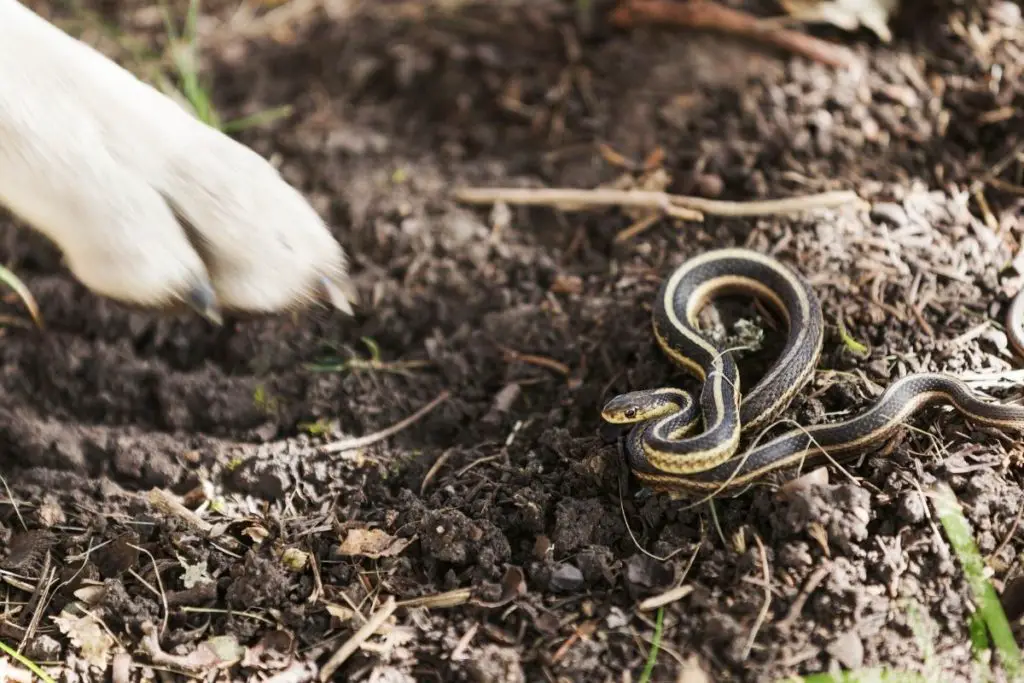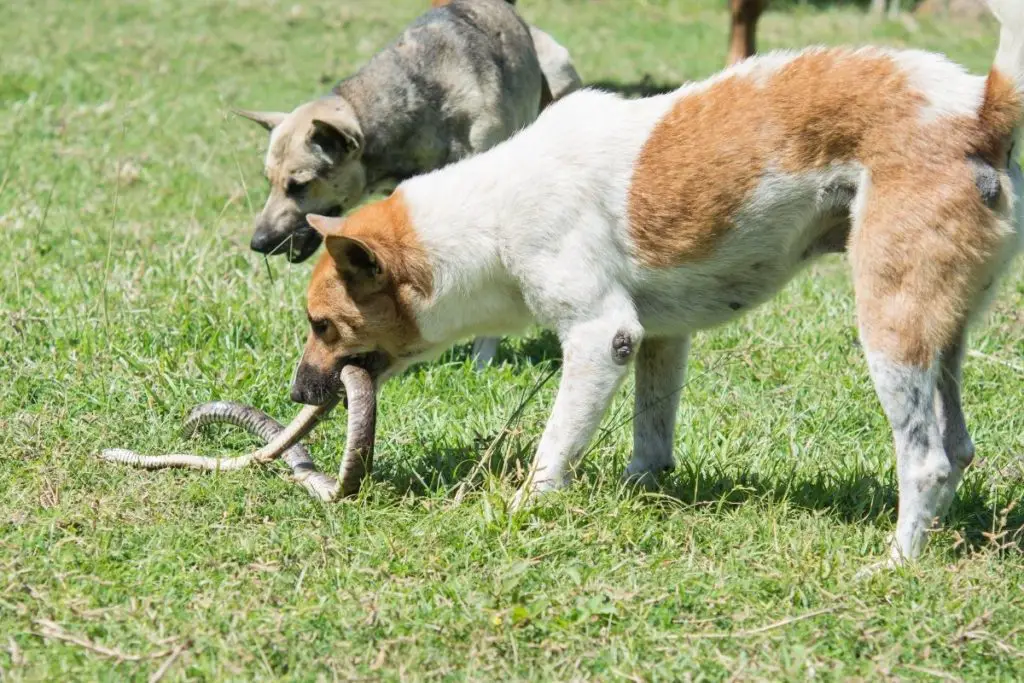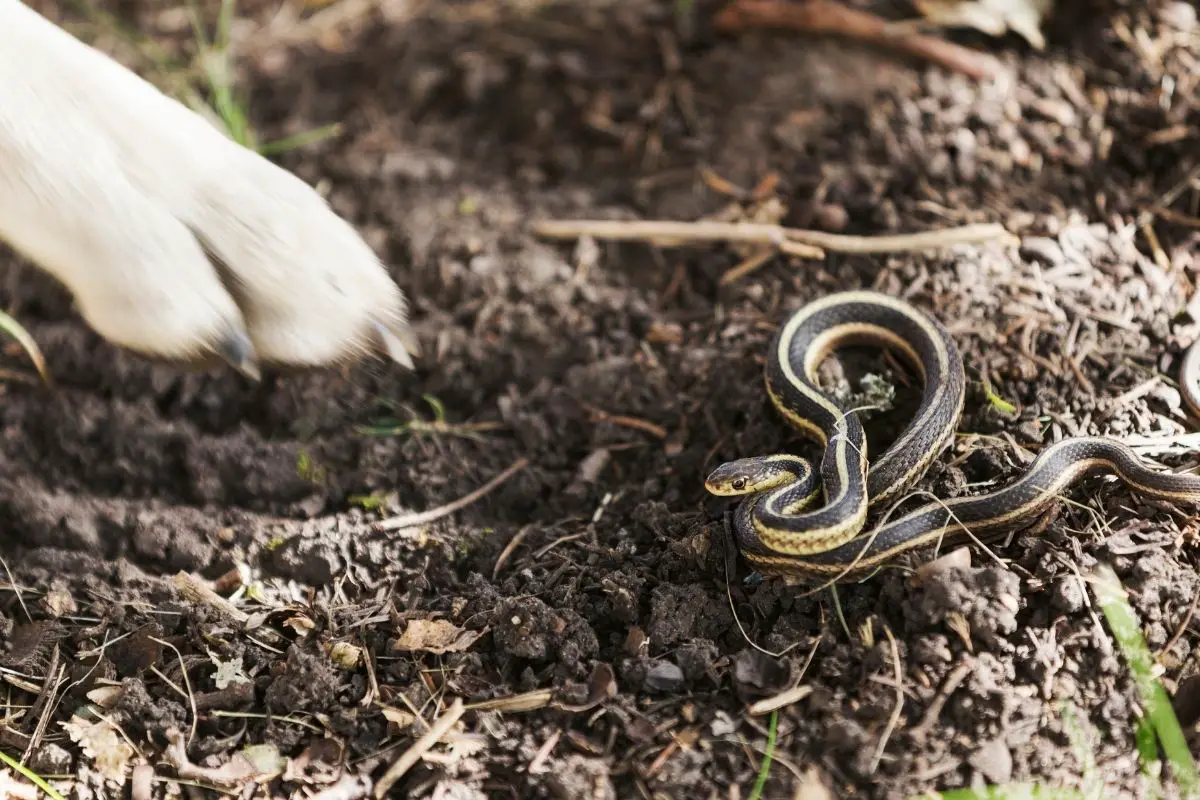It is an age-old question: Do dogs attack snakes? Do they kill them or run away? Do they even know what a snake is?
These are all really important questions to answer, especially if you live in a snake-infested area, to make sure you and your dog stay safe from snake attacks.
Let’s start with the important questions first:
Do Dogs attack snakes? Dogs attack snakes if they feel the snake is threatening to them, their house, or their family. Dogs do not fear snakes at all and once a dog smells a snake, they are very likely to approach and investigate to decide if they pose a threat, however, this often leads to the snake biting the dog.
To understand why and when a dog will attack a snake, whether this attack will be successful, and how to keep your dog and yourself safe from snakes, keep reading…
Contents
Why Do Dogs attack snakes?

Research has shown that while humans have an instinctive fear of snakes, dogs do not share this fear. In fact, research has shown that when a dog smells a snake, they are aroused and will go to investigate, rather than flee.
Recent studies have proven that snakes do not terrify dogs like us, but rather pique their interest. When a dog sees a snake, they don’t turn away and run, but will often investigate them and some dogs – especially terriers – will outright attack them.
But why do dogs attack snakes?
It’s not really about the animal – the snake – themselves, but rather the threat they pose. Snakes move sneakily, which means a dog may be startled by them, and a startled dog is an aggressive dog.
Dogs are also instinctively protective of their possessions, properties, and families. So, if you are nearby, or your kids are, and a dog detects a snake, the dog is likely to quickly categorize the snake as a serious threat and turn on their fight mode, which leads the dog to attack the snake.
But are these attacks successful?
Can dogs kill snakes?
Yes, dogs can kill snakes , and certain breeds, such as terriers, have been developed to hunt and kill small moving animals like snakes and rodents.
Dogs will shake snakes violently enough to paralyze them and prevent them from biting the dog, after which they may be slain with a powerful bite to kill the snake.
However, some breeds are just better at it than others. You can learn about the best dogs to kill snakes here.
The snake usually doesn’t go away without a fight, though, and if it can bite the dog, it will do so without a millisecond of hesitation. Unfortunately, snake bites on dogs are dangerous and sometimes even fatal.
Researchers estimate that while about 7,000 to 8,000 adults are bitten by snakes every year in the US, about double that number (15,000) of pets are bitten by snakes, and most of these bites are delivered to the pet we love the most and spend the most time outdoors with; dogs, of course.
How do Dogs react to snakes?

Most dogs are not afraid of snakes, but they will be wary around them. If a dog hasn’t had much exposure to snakes, it’s likely that the dog won’t interact with them at all – in this case, your pet is safe from snake bites.
However, if you have or live near large bushes and plants where snakes like to hide and sunbathe, make sure your dog doesn’t get too close.
Do snakes bite dogs?
Snakes can and do bite dogs, and snakebites are very expensive to cure at a veterinarian. Snakebites might cause infections in dogs as well as the risk of death if the snake was poisonous.
After being bitten, it’s conceivable that your dog no longer wants to pursue and kill snakes. It implies that, after receiving one bite, your snake-killing dog may retire for good reasons.
It’s also very important that you recognize the signs of a snake bite on your dog so you can react correctly.
Signs of snake bites on dogs
These are the signs/symptoms of a snake bite in dogs:
- Sudden muscle weakness and collapse, followed by your pet getting up normally.
- Snake bites are one of the reasons for this type of collapse, but not the only one.
- Twitching, shaking, or jerking of muscles Diarrhea or vomiting
- Unsteadiness/weakness in hind legs
- Excessive drooling, foaming at the mouth
- Bloody urine
Furthermore, look for any of the following symptoms when treating a dog snake bite: Bite wounds and discomfort/swelling around the site of a bite. Snakes will frequently bite your dog in the face, neck, or legs as he or she attempts to catch them. In many circumstances, there may be two or more bites, and they can occur anywhere on the body.
Antivenin should be administered as soon as possible, so contact a veterinarian immediately if you suspect your pet has been bitten by a snake.
What to do if your dog attacks a snake?
You should command your dog to come to you without you getting any closer yourself. If your dog fails to follow the command, try grabbing their attention with a toy, food, or anything close by.
If you fail to grab your dog’s attention by anything, try deterring your dog from the snake by spraying them with water from a hose if possible.
Do NOT, for any reason, get too close yourself and risk getting bitten. A snake bite on your dog is bad, but the loss of human life is absolutely tragic and is not something you should risk.
Do not attempt to capture or kill the snake responsible yourself; instead, seek immediate veterinary attention and leave dead snakes where they are until animal control can safely remove them. Do not run over the snake with your car or try to kill it yourself; if you can avoid doing so, that’s best for everyone involved.
It is very important that we protect our pets and keep them safe from dangerous hazards such as snakes and other wild animals who might want to harm our dogs.
By providing a little training and some education about how to keep our dogs safe from snakes, we can avoid many of these dangerous and sometimes fatal situations.
Helpful Resources
The nose may not know: Dogs’ reactions to rattlesnake odours
A Guide to snake bites on dogs
If you like this article, please share it!


